From the downbeat to Britten’s A Midsummer Night Dream at Opera Theatre of Saint Louis, we instantly sensed there was musical magic in the air, for the esteemed Leonard Slatkin was in the pit.
Maestro Slatkin worked wonders with his forces and the always fine orchestra featuring members of the Saint Louis Symphony played especially luminously all evening long. This is a very challenging score, with no hiding place, and whether in solos or ensembles, the band was at its very best. Special mention must go to the flawless trumpet solos from Omri Barak, which are a signature feature of this unique score. The orchestra is really another character in this piece with its colorful commentary and pageantry, and they collaborated meaningfully in the action. Maestro also displayed sublime command of the uniformly fine cast on stage.
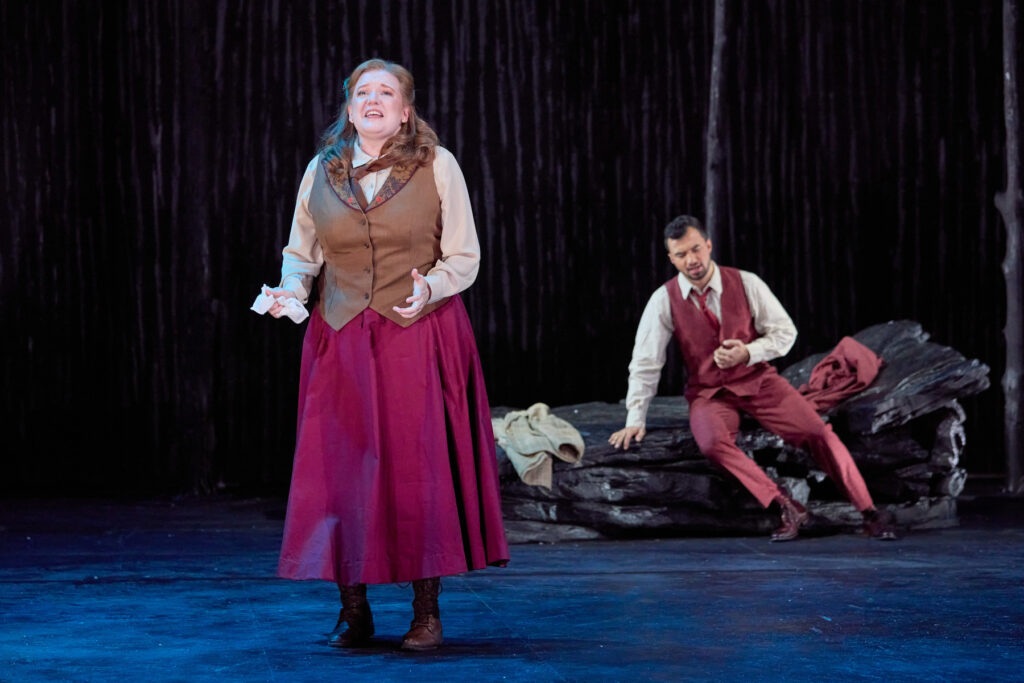
Jana McIntyre, sleek of physique and ethereal in movement as Tytania, impressed us with a silvery soprano and melting technique that was wholly bewitching in its effect. Lanky James Laing was an accomplished Oberon, his stature and plangent, impactful countertenor lending almost a spectral presence to the proceedings.
We were fortunate to have a prodigiously gifted quartet as the young lovers. As Lysander, Anthony Léon could not have been a more handsome, honeyed voiced tenor, his forays into the higher passages were quintessentially dreamy, indeed. As his competitor, Demetrius, the charming baritone Theo Hoffman once again made me wonder how such a burnished, booming baritone can emanate from his slender appearance. Jennifer Johnson Cano could not have been bettered as an especially potent Hermia, unleashing her lush, well-schooled mezzo with great variety and nuance. And as a tremulous Helena, Teresa Perotta’s radiant soprano shone in all registers, but notably blossoming at the top. These four remarkable vocalists made the Act III quartet a melting and memorable highpoint of the production.
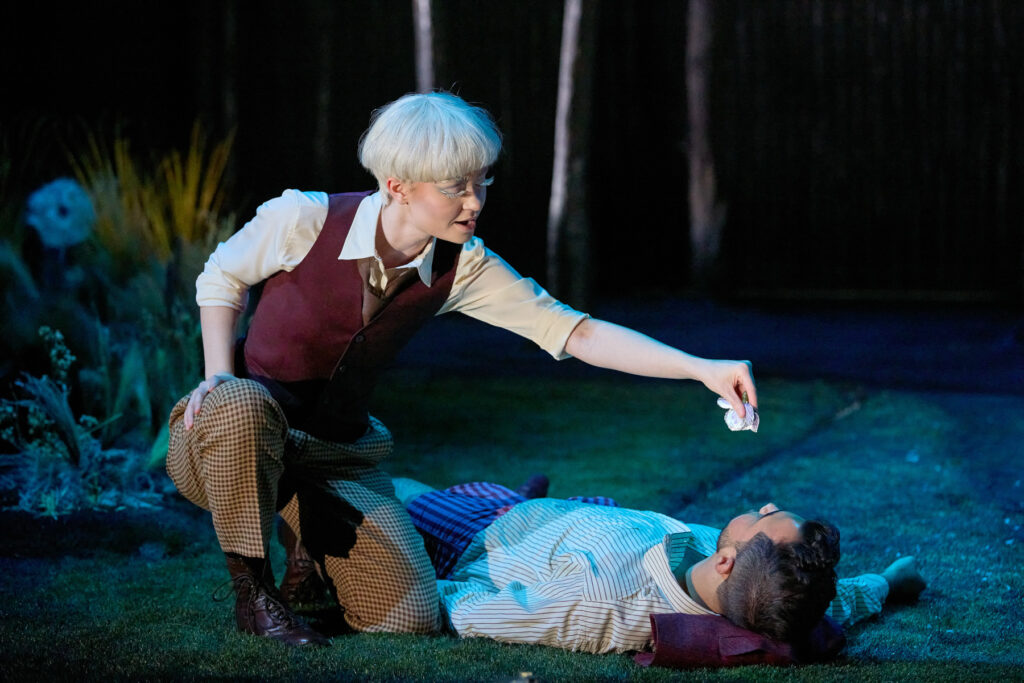
The Rude Mechanicals can pretty much be guaranteed to run off with the show, and here was no exception, not only for their inspired physical comedy but also for their robust, well-characterized singing. Robert Mellon was an unusually fine Quince, lavishing the hapless wannabee theatre manager with a potent, buzzy baritone. As Snug, Dylan Gregg’s handsome bass-baritone added substantial richness to the comic troupe. Adam Partridge imbued Starveling with a mellifluous, well-focused baritone, and Christian Sanders was the boyish Flute, showing off a lithe, gleaming tenor and a hugely winning stage presence. The role of Snout was well served by the pointed, polished tenor of Sam Krausz.
Of course, the play and score are crafted to position Bottom at the very top of this disparate troupe of ragtag actors, and boy, did bass-baritone Ben Brady ever deliver the goods! His big, buzzy sound rang out in the house, and his well calculated delivery was always controlled, yet ebullient and wholly engaging. This was no bombastic caricature, but a full throated, fully formed character that was light years ahead of the more usual hammy presentation. His final solo scena, When my cue comes, call me, was a model of wit, dramatic truth, and marvelous vocalizing.
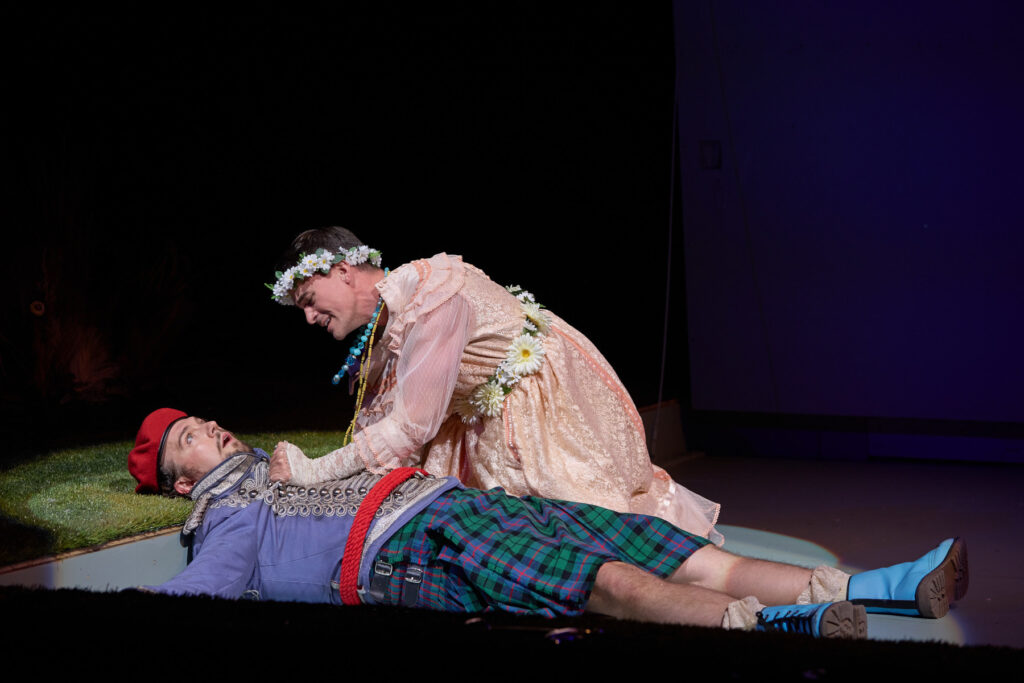
Arriving on the scene very late in the night, bass-baritone Jose Olivares impressed mightily as a potently delivered Theseus, and he was matched in well calculated firepower by Michelle Mariposa’s imposing, richly tinted mezzo as Hippolyta. The named fairies were well-voice by a quartet of Gerdine Young Artists: Emilie Kealani (Cobweb), Veronica Siebert (Mustardseed), Laura Santamaria (Peaseblossom), and Zoe Brooks (Moth). It was indeed luxury casting to have these exceedingly talented singers perform these short roles with relish and a warm presence.
It is not often that a leading role in an opera does not sing, but such is the case with Britten’s take on the impish Puck. Without singing a note, the engaging actor Matisse Carmack embodied the feckless troublemaker with endearingly lithe physicality and knowing declamation.
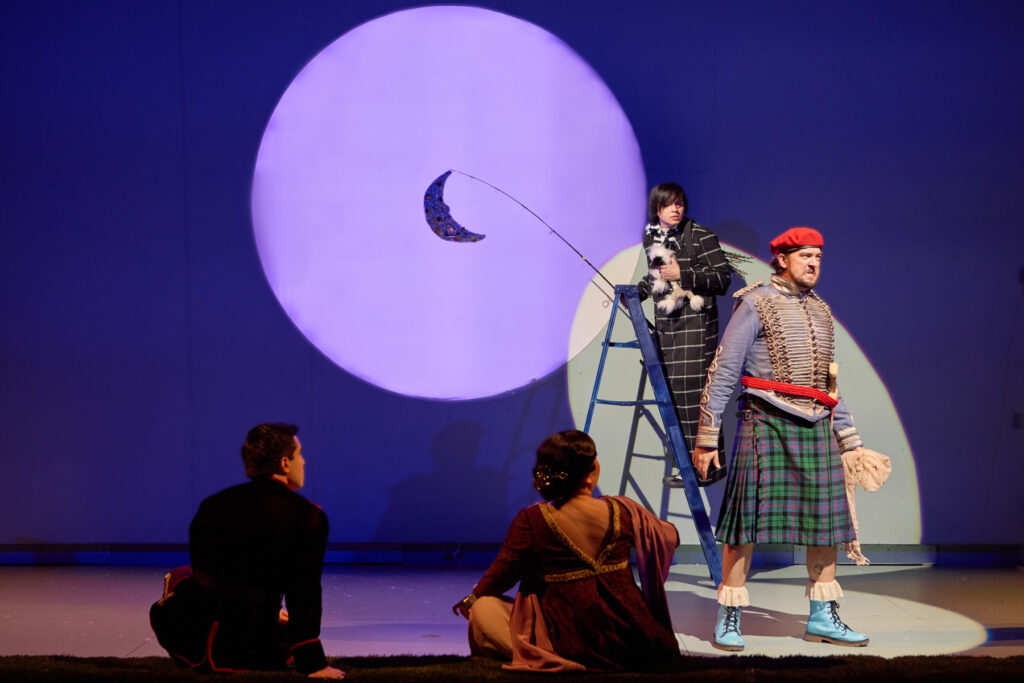
It is always a pleasure to encounter a creative team who believes that less can be more, starting with set and costume designer Emma Kinsbury. With great economy of gesture, her spare but effective scenery is all that is needed but no more than necessary. A few denuded trees, a pile of slabs for a bed, and a traveling forest scrim are all that are needed to work theatrical magic. I loved the scenic coup de théâtre before the penultimate wedding scene that brilliantly, spontaneously, and almost breathtakingly altered the visuals. Moreover, Ms. Kinsbury’s costumes help immensely to define the characters, with the lower and middle classes in suitably rustic attire, the royals in regal dress-up finery, and the fairy world in luxurious , fanciful raiment.
Krystal Balleza and Will Vicari did Yeoman’s work finishing off the “look” with fanciful hair and make-up, even including a surprise of lights imbedded in the fairies’ wigs! Magical, indeed. Too, lighting designer Marcus Doshi beautifully illuminated Kinsbury’s design, with superb, isolated specials, moodily atmospheric washes, and well-considered area definitions.
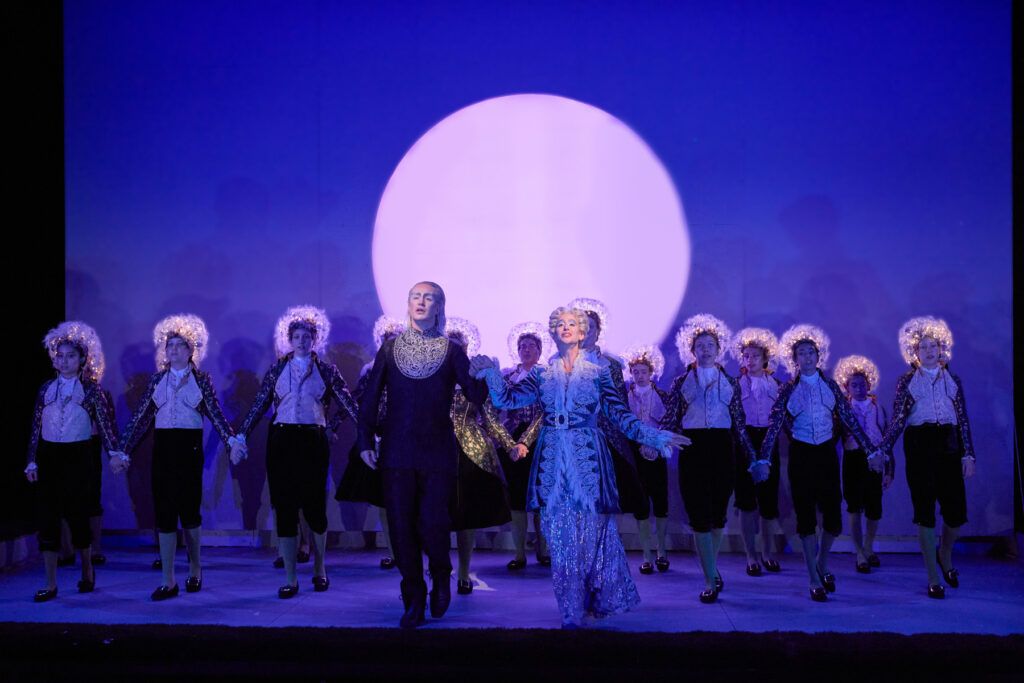
Finally, veteran Tim Albery was a no muss, no fuss, no nonsense stage director of the sort I was not sure we had anymore. Mr. Albery was content to tell the story with clear cut character relationships, varied and motivated blocking, and highly polished yet beautifully inventive storytelling from a master craftsman. He emphatically proved that no lilies need to be gilded in staging this masterwork.
I have long said that I have never seen an indifferent production of A Midsummer Nights Dream. Owing to its musical demands and its large forces, it is a festival kind of opera. I can further say that this profoundly successful interpretation at OTSL is a nonpareil resounding success, and one of the very best in my experience. Happy Fiftieth Anniversary! May your next fifty midsummers of operatic achievements be as shining and bright.
James Sohre
A Midsummer Night’s Dream
Music by Benjamin Britten
Libretto by Peter Pears and the composer after William Shakespeare’s play
Cobweb: Emilie Kealani; Mustardseed: Veronica Siebert; Peaseblossom: Laura Santamaria; Moth: Zoe Brooks; Puck: Matisse Carmack; Tytania: Jana McIntyre; Oberon: James Laing; Lysander: Anthony Léon; Hermia: Jennifer Johnson Cano; Demetrius: Theo Hoffman; Helena: Teresa Perrotta; Quince: Robert Mellon; Snug: Dylan Gregg; Starveling: Adam Partridge; Flute: Christian Sanders; Snout: Sam Krausz; Bottom: Ben Brady; Theseus: Jose Olivares; Hippolyta: Michelle Mariposa; Conductor: Leonard Slatkin; Stage Director: Tim Albery; Set and Costume Designer: Emma Kingsbury; Lighting Designer: Marcus Doshi; Wig and Make-up Designers: Krystal Balleza, Will Vicari; Choreographer: Seân Curran; Chorus Master: Andrew Whitfield
Top image: Oberon (James Laing) and Tytania (Jana McIntyre) surrounded by a chorus of fairies, featuring members of the St. Louis Children’s Choirs.
All photos © Eric Woolsey.